Russia This Week is a weekly review by the MEMRI Russian Media Studies Project, surveying developing stories in Russian domestic affairs as presented in the Russian media.
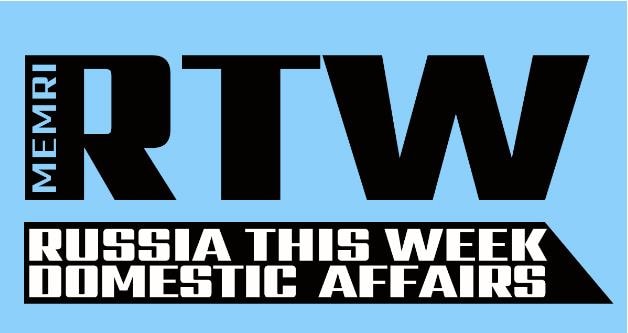
Photos Of The Week

Man detained by the police, during anti-corruption protests, organized by opposition activist Alexey Navalny on March 26, 2017. (Source: Gazeta.ru)

Man stopped by the police, during anti-corruption protests that were organized by opposition activist Alexey Navalny on March 26, 2017. (Source: Gazeta.ru)
In The News:
Navalny Leads Russia's Anti-Government-Corruption Protests
On March 26, 2017, Russians took to the streets in anti-governments rallies, organized by opposition politician Alexey Navalny, who recently announced his candidacy for the 2018 presidential elections. The demonstrations marked the 17th anniversary of Russian President Vladimir Putin's rise to power on March 26, 2000. The demonstrators were protesting corruption in Russia, following Navalny's investigation into Russian Prime-Minister Dmitry Medvedev extensive property holdings. The unauthorized protests were held in 87 cities across the country. St. Petersburg and Moscow were the focal cities of the peaceful protests. The police estimated that those participating in the Moscow rally alone numbered 6000-8000. Opposition sources insist that scores of thousands were at the march. The Russian media outlet Gazeta.ru reported that many young people, who have never witnessed a change in power previously, participated to the protests.
See MEMRI Special Dispatch No. 6850, Navalny Leads Russia's Anti-Government-Corruption Protests, March 29, 2017.

Navalny is arrested by the police. (Source: Themoscowtimes.com)
Communist MP Valery Rashkin filed a formal request with Russia's Investigative Committee, asking its director, Alexander Bastrykin, to investigate the corruption allegations against Medvedev.
(Themoscowtimes.com, March 29, 2017)

ashkin's formal request. (Source: Twitter.com/RashkinV)
The independent media outlet, Meduza.io, reported that Mikhail Konstantinov, a philosophy and culture lecturer at Siberian Federal University was fired for showing Navalny’s video on Medvedev’s secret assets.: "According to Konstantinov, one of his students complained about the screening of the Anti-Corruption Foundation’s video. The situation was brought to the attention to university rector Evgeni Vaganov and Konstantinov was fired.
"The university confirmed that Konstantinov was no longer employed by the institution, maintaining however, that he had resigned of his own accord, without offering reasons in explanation. The university’s press office noted that any dismissal as a result of the screening would be 'at the very least strange,' as the film is in the public domain and students can watch it themselves."
(Meduza.io, March 22, 2017)
Targeting Opponents With Zelyonka
Earlier, on March 19, Navalny was doused with a green dye, a cheap antiseptic known as zelyonka, during his visit to the Siberian city of Barnaul, to campaign for the presidential elections. Navalny said that the assailant then jumped into his car and parked in front of the regional administration headquarters. Navalny said it made him feel like he was starring in the film "The Mask" and even his teeth were green.
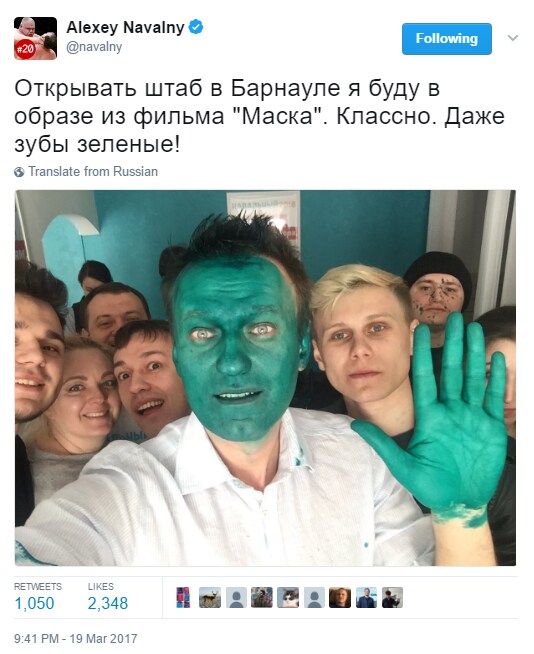
(Source: Twitter.com/navalny, March 19, 2017)

Alexey Navalny (Source: Twitter.com/navalny)
This is not the first time that zelyonka is being used against opposition figures. Last February, the president of the opposition party PARNAS and the former prime minister, Mikhail Kasyanov, was similarly doused with zelyonka, during a march to honor the memory of the slain opposition politician Boris Nemtsov.
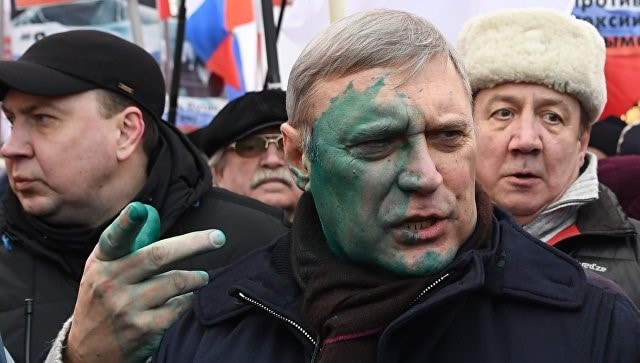
Mikhail Kasyanov (Source: Ria.ru)
In April 2016, Russian nationalists doused the Russian writer Lyudmila Ulitskaya with zelyonka, during an awards ceremony for high school students on the 20th-century history, organized by the Russian historical society Memorial.
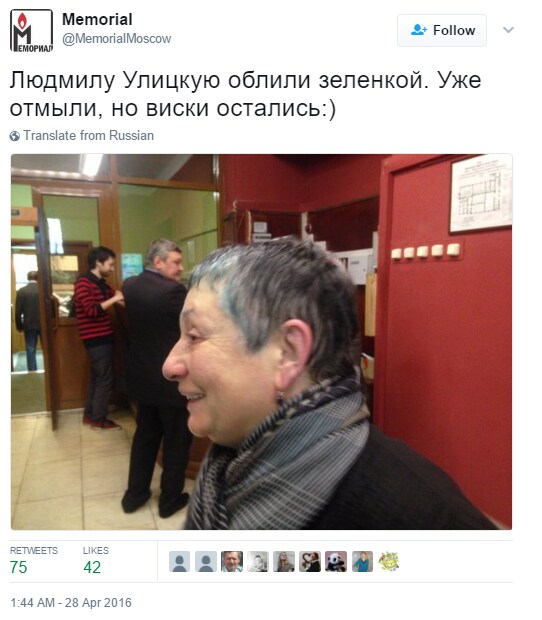
Lyudmila Ulitskaya after removing zelyonka (Source: Twitter.com/MemorialMoscow)
In 2014, two members of the band "Pussy Riot", human rights defender Andrei Yurov and - more recently in 2016 - the head of the NGO Committee Against Torture, Igor Kalyapin, were doused with zelyonka.
(Novayagazeta.ru, March 19, 2017)
Putin's Initial Reaction To Navalny's Protests:
Russian President Vladimir Putin: "The only thing that I consider wrong is a situation in which some political forces try to use all these instruments not for improving the situation in the country, but for their selfish interests, for self-advertising in the political scene ahead of certain political events, including an election campaign… Therefore I say YES to the struggle against corruption and NO to the use of this instrument for narrow, selfish political aims. All those who step beyond the bounds of that law must be punished under Russian legislation."
(Tass.com, March 30, 2017)
Kremlin spokesman Dmitry Peskov said that he doesn’t have any information that there had been foreign influence on the March 26 protests in Moscow. He then added: "In Russia, we call this provocation. Inviting people to take part in an event that had not been authorized and was beforehand illegal and on the contrary, depicting this event as authorized and legal is provocation." Russia's news agency TASS reported that Peskov declined to answer a question if Putin had altered his relationship to Medvedev after the rallies. Peskov said: "I consider that this is an incorrect question."
(Tass.com, March 30, 2017)
Where Was Medvedev?
On March 26, while thousands of demonstrators were protesting against corruption, following Navalny's investigation into Russian Prime-Minister Dmitry Medvedev extensive property holdings, Medvedev sparked even more criticism with a message on Instagram. Answering to the question "How was your day?' asked by Instagram user "inspiridonoff," Medvedev (damedvedev) wrote back: "Not bad, I was skiing," adding an emoji.
(Rosbalt.tu, March 27, 2017)

(Source: Rosbalt.ru)

Detail of the Instagram chat.
Earlier, on March 14, Medvedev was absent rom a cabinet meeting. To explain his absence, Putin said that although the flu epidemic in the country was abating , "we could not save Dmitry Anatolyevich [Medvedev]," hinting that Prime Minister was ill. However, few days later, on March 16, the owner of Coffee Bar Berry in the posted a photo of Medevdev in her shop in the snow resort of Arkhyz, a village in the Greater Caucasus. In the post she wrote that on March 10, her coffee bar was honored to host Medvedev and Russia's Deputy Prime Minister Alexander Khloponin. Few days later, Medvedev told the Russian news agency Interfax that he was not sick at all.
(Mk.ru, March 14, 2017; Themoscowtimes.com, March 17, 2017; Ria.ru, March 23, 2017)

(Source: Instagram.com/coffeebarberry)
Opposition media outlet Kasparov.ru published a short satirical play by Russian sociologist Igor Eidman, inspired by Medvedev's alleged flu:

Medvedev to Putin: "I am not sick!" (Source: Kasparov.ru)
Vovan [Putin] (mockingly): "Alas, we failed to save Dmitry Anatolyevich [Medvedev]".
Dimon [Medvedev] (defiantly): "But I was not sick."
Vovan (firmly): "You were sick if I said so!".
Dimon (desperately, resembling a doomed man): "I was not sick at all, do you hear me, I was not sick, I was not sick!"
Vovan (mockingly): "You were not? (He turns around and theatrically slaps Dimon in the face) Fine, you will be now!"
Eidman then wrote that Putin and Medvedev have "quietly despised each other" adding: "The 'medical history' story apparently went like this: after Navalny's revelations Dimon got upset and went on a drinking binge. Vovan decided to taunt him and show everybody what a weakling he [Dimon] was and so made a joke about 'having failed to save' him (whether from the disease or from Navalny). Dimon took offense and set about demonstrating that he is fine and is unafraid of anyone. So he posted a photo of his vacations in the mountains and then defiantly denied his illness as announced by Putin."
(Kasparov.ru, March 24, 2017)
Patriotism
A few days following the March 26 protests, the Russian Ministry of Education said it will use social media to create a new generation of patriotic Russian schoolchildren. The Moscow Times reported: "The ministry's latest 'patriotic education program' hopes to stir 'feelings of loyalty to the Fatherland' among Russian youth and prepare them to 'fulfill their civic and constitutional duties to protect the Fatherland's interests.'
"Officials hope that an outside contractor will build the ministry's presence on Russian social network sites Vkontakte and Odnoklassniki, as well as Facebook, Twitter, Instagram, YouTube, Livejournal and Telegram messenger, according to an official tender released on Monday.
"In return for the 8 million ruble ($142,000) contract, the lucky winner is expected to grow the ministry's internet audience by 25 percent by the end of 2017.
"Officials were keen to stress that the role went beyond posting photos and updating accounts. Any company which wins the tender must be prepared to work with bloggers and mastermind special hashtags for Russia's kids to use during public holidays, the Russian tabloid Izvestia reported."
(Themoscowtimes.com, March 30, 2017)

(Source: Izvestia.ru)
The Big Brother
The Russian Ministry of Communication recommends making it legally obligatory for internet and smartphone users to provide the authorities with a list and identity information of those whom the particular user permits access to his computer and smartphone. This means that if you let someone use your smartphone to make a call or surf the net you have to write down his identity info and pass it on to the authorities.
(Echo.msk.ru, March 30, 2017)
Economic Protests
A rare social protest took place in Novosibirsk, Siberia, the third most populous city in Russia, following the raise of municipal water, gas, electricity and heating charges. Thousands marched to demand that the rate hike be cancelled. This is the fifth protest since July 2016 when the new charges were introduced. The municipal officials as well as the governor chose not to appear before the crowd.
(Interfax.ru, March 19, 2017)
In Kazan, a large industrial city in central Russia, hundreds of protesters marched following the collapse of a few local banks. The protesters demanded that the government provide them with financial compensation for their losses.
(Interfax.ru, March 18, 2017)
Truck drivers throughout Russia are protesting against highway tolls. Truckers are demanding the abolition or a reduction in the "Platon" toll system, introduced 2015. Tthe Platon regulations impose compensation payments on truck owners or companies-carriers that have vehicles with a capacity exceeding 12 tons, to compensate for the heavy damage that their vehicles inflict on the roads. From April 15, 2017, the toll for heavy trucks traveling on Federal highways will rise by 25% and will total 1.91 rubles.
(World.24-my.info, March 27, 2017)

Echo Moscow's journalist, Arseny Vesnin, published a video on the truckers' protests in St. Petersburg in his Twitter Account. (Source: Twitter.com/ars_ves, March 27, 217)
Caption: “In St. Petersburg the truck drivers strike began. Lots of cars on only one side of the road.”
According to an editorial in Gazeta.ru, the protest activities on economic grounds are spreading as the authorities fail to provide the population with adequate responses to declining living standards while living costs and taxes increase. Some protests, such as the protest against transferring St. Petersburg's Isaac Cathedral to the Russian Orthodox Church have snowballed into demands for impeaching the governor. The editorial emphasizes that failing to receive clear signals from the federal authorities, the authorities are not dealing with the evolving situation, and the socio-economic-cultural protests acquire political dimensions..
According to the editorial, momentarily, all these protests are still unrelated and have little in common and therefore pose no threat to the political system's stability. But if the authorities fail to deal with local protests they will definitely grow and turn local social-economic conflicts into political ones. If this happens no one can predict which decision – on the local or federal level – will spark mass popular outrage.
(Gazeta.ru, March 3, 3027)
Navalny's Demonstration Viewed By A Foreign Putin-Sympathizer
Matteo Salvini, leader of the Italian populist party Lega Nord and a recent visitor to Russia, gave the following interview, on the March 26 protests in Russia, to the Italian daily La Stampa:
Q: "Will you continue to view their actions favorably after what happened yesterday [i.e. the arrests of demonstrators]?"
Salvini: "I am in favor of freedom of thought and also of authorized protest rallies. But I don’t think that this [rally] was authorized."
Q: "In your opinion, does this justify the arrest of an opponent of PM Medvedev and of president Putin?"
Salvini: "I did a research and I got some information about this guy. [Navalny is] an anti-Putin blogger, portrayed as the leader of the opposition. However, according to estimates, he is only worth 3%. In short, he is only one of Putin's many opponents..."
Q: "Are you not embarrassed by the positions of the Russian government?"
Savini: "Not at all. The fact that it is considered dictatorial makes me smile. I will only note that this year, Russia will grow more than Italy. Moreover, I also envy the Russian fiscal system because they only have a single tax."
Q: "So, long live the Putin 'regime'?"
Salvini: "I repeat, in Russia, six months ago, elections were held. 48% of the Russians voted and a parliament was democratically elected. Furthermore, a few days ago, a survey carried out by an institute, close to the U.S., indicated that Putin has a popularity rating of 85%"
Q: "Between Putin and democratic Europe, who are you going to choose?"
Salvini: "How could I ever choose this Europe, where the commission is unelected [by the people] and somebody like Junker, the president of the UE commission, only serves the interests of banks and multi-nationals."
Q: "Then, are you going to bet your entire stake on the Russian president?"
Salvini: "I appreciate Putin’s work. And I believe that Marine Le Pen and François Fillon, France’s Berlusconi, are on the same wavelength. And let us not forget that even [former Italian Prime Minister Matteo] Renzi asked that the sanctions be lifted..."
(Lastampa.it, March 27, 2017)

Salvini sports a Putin T-shirt in Moscow (Source: Dagospia.it)
Russia's Economic Crisis
On February 6, 2017, The Moscow Times published an article, titled "Russians Are Getting Used to Being Broke." The following are excerpts of the article:
"Russia’s recovery from the current recession continues to slow, according to the Economic Development Ministry. The reason: demand has plummeted. If that is the case, it means the Russian economy’s decline is in full swing despite official statements that the recession has ended.
"The decline in retail turnover – the primary indicator of consumption – accelerated in December. The entire last quarter as a whole, has been tough for retailers. The largest retailers either saw declines in revenues or the rate of growth slow. One in every three retailers complained of a drop in demand at the end of last year, according to the State Statistics Service. That was worse than the previous quarter, which means that consumers are economizing even more now.
"The Russian middle class has nearly exhausted its savings, says Lilia Ovcharova, director of the Higher School of Economics Institute for Social Policy. Previously, 60 percent of the population either chose not to make any purchases or opted for less expensive alternatives. Now that figure stands at 75 percent. The number of those expecting the economic crisis to continue for some time has ballooned.
"The Higher School of Economics also points out that most people have responded passively to the crisis, with 40 percent opting for less expensive products and 40 percent buying fewer goods. At the same time, more people are looking for higher-paying jobs (18 percent) or farming additional plots of land (14 percent).
However, without savings to ride out the transition, even looking for a new job can be difficult... Russia’s economic recovery has stopped, but people have grown used to the crisis: 40 percent consider themselves poor, but only 22 percent consider their economic situation bad or very bad. That means they have grown accustomed to it."
(Themoscowtimes.com, February 6, 2017)
Crimea's Reunification
On March 18, 2017, Russia celebrated the anniversary of Crimea's annexation. According to the Russian news agency TASS, 150,000 people gathered in Moscow's University Square to celebrate the third anniversary of Crimea’s reunification with Russia.
(Tass.com, March 18, 2017)
Federation Council Speaker Valentina Matviyenko wrote in her blog on the Federation Council’s website that the Crimea's reunification "helped save Crimea's Russian population of Crimea from the bloodshed plotted by the Ukrainian neo-Nazi nationalists, [who are] obsessed by anti-Russian sentiment."
(Tass.com, March 17, 2017)
Irina Kravtsova, a correspondent for the independent media outlet Meduza.io, answered an advertisement for "tidily dressed people" willing to receive 300 rubles for 3-4 hours of their time. Following instructions she reported a train station where she met other people who answered the ad and soon a coordinator and a person bearing the banner "the independent union of stage and film actors" made their appearance. One participant in the rent-a-crowd business claims that she has been doing this for some time and believes it is done everywhere especially for U.S. elections as who would attend a rally for Clinton of their own free will? The coordinator explained that "the state asks the political parties to guarantee mass participation, the parties ask labor unions, while labor unions outsource the task to people like me".
(Meduza.io, March 18, 2017)
Sanctioned Russian Citizens Exempted From Tax Payments In Russia
Meduza.io reported: "The State Duma adopted a bill that will allow Russian citizens under sanctions to avoid reporting their incomes and paying taxes in Russia. The bill was passed by a majority of 322 votes for, 85 votes against, with one abstention. Russia’s Labor Party, Communist Party, and A Fair Russia Party voted against the bill.
"It allows the Russians owning businesses or property abroad to avoid paying taxes in Russia if they have been placed under sanctions. Previously, such individuals were obligated to pay taxes in Russia, because they were not allowed to leave the country as a result of sanctions. The amendment was attached to a law that was totally unrelated to sanctions.... Meduza has learned that of all the Russian citizens who were placed under sanctions, the new law primarily benefits the billionaire [and Putin's friend] Gennady Timchenko. Timchenko paid taxes in Switzerland for many years, but was forced to live in Russia since 2014 due to sanctions."
(Meduza.io, March 22, 2017)
Former Russian MP Assassinated In Kiev
Ukrainian President Poroshenko accused Russia of assassinating Russia’s former Communist State Duma member Denis Voronenkov. The former MP fled Russia with his wife, an active MP from the ruling United Russia party, and delivered harsh testimony against former Ukrainian president Viktor Yanukovich. According to Yuri Lutsenko, prosecutor general of Ukraine: "This is a cynical murder of one of the witnesses, testifying against former president Yanukovich. He provided the very important information to the military prosecution officers on the issue. Thus, this is a usual Kremlin's act of exhibitionist butchery against a witness."
Senator Frantz Klintsevich, deputy chair of the Federation Council Defense and Security Committee, shifted blame for the murder to the Ukrainian forces: Klintsevich said: "My priority version is: this is a provocation organized by the Ukrainian security forces. This coincides with their behavioral stereotypes, their modus operandi. This is what the Ukrainian security services and their authorities have been doing lately."
(Meduza.io, March 23, 2017)
Moscow slammed claims about a ‘Russian link’ to the killing of Voronenkov in Kiev. Kremlin spokesman Dmitry Peskov said: "We believe that all speculations about a Russian connection are absurd."
(Tass.com, March 23, 2017)
Chechen President Kadyrov Criticizes The EU High Court For A Hijab Ruling
Chechnya’s leader Ramzan Kadyrov accused the EU’s highest court of having declared a war on religion, after allowing employers to prohibit their employees from wearing hijabs. Kadyrov wrote:
"There are processes taking place in Europe aimed at blurring national and religious identity. European politicians and social activists are cultivating a new 'culture', based on total denial of faith, morality and ethics. The main symbol [of this culture] is political, domestic and ethical immoralily. The European authorities forcefully promoting gay marriages among people, and place children in such 'families'. Distinguished political figures deem it honorable to talk publicly [about their sexual contacts] with [partners] of the same kind.... In Nazi Germany the genocide took place on the basis of national discrimination. If you [Muslims and other religions] keep silent, there is no guarantee that history will not repeat itself –on the basis of religious discrimination."
(Source: https://www.instagram.com/kadyrov_95)

(See: Kadyrov's post)
Human Rights
The Russian independent media outlet MediaZona, founded by two members of the Russian punk rock band Pussy Riot, MediaZona, reported that Russian security services allegedly tortured a student from the Moscow State University for hanging a Ukrainian flag.
(Zona.Media, March 21, 2017)
On March 7, a shopkeeper, Oxana Sevastidi was pardoned by Putin. The woman, 46 years old, was convicted in March 2016 for an SMS that she sent in 2008. Meduza.io reported: "Sevastidi was accused of taking several photographs of trains with military equipment at a train station in Sochi in 2008 and sending them to her friend in Georgia. In an interview with Meduza, Sevastidi claimed to have sent the messages in April 2008. However, the prosecution insisted that Sevastidi said she sent the SMS in August 2008 (when an armed conflict between Russia and Georgia occurred in South Ossetia). Sevastidi was arrested in January 2015, more than six years after she had sent the SMS. In March 2016, the Krasnodar Regional Court sentenced her to seven years in prison. Sevastidi started serving her sentence in a penal colony in the Ivanovo region... Sevastidi is not the only Russian citizen who has been sentenced for SMS-correspondence. The Krasnodar Regional Court passed almost the exact same verdict in 2014 against Sochi resident Ekaterina Kharebava, who was sentenced to six years in prison for espionage. Kharebava also sent an SMS to her friend detailing how, in 2008, shortly before Russia’s war with Georgia, she saw how Russian military equipment was being transferred in the direction of Abkhazia. According to Sevastidi, the cases against both women were conducted by the same investigator, prosecutor, and judge."
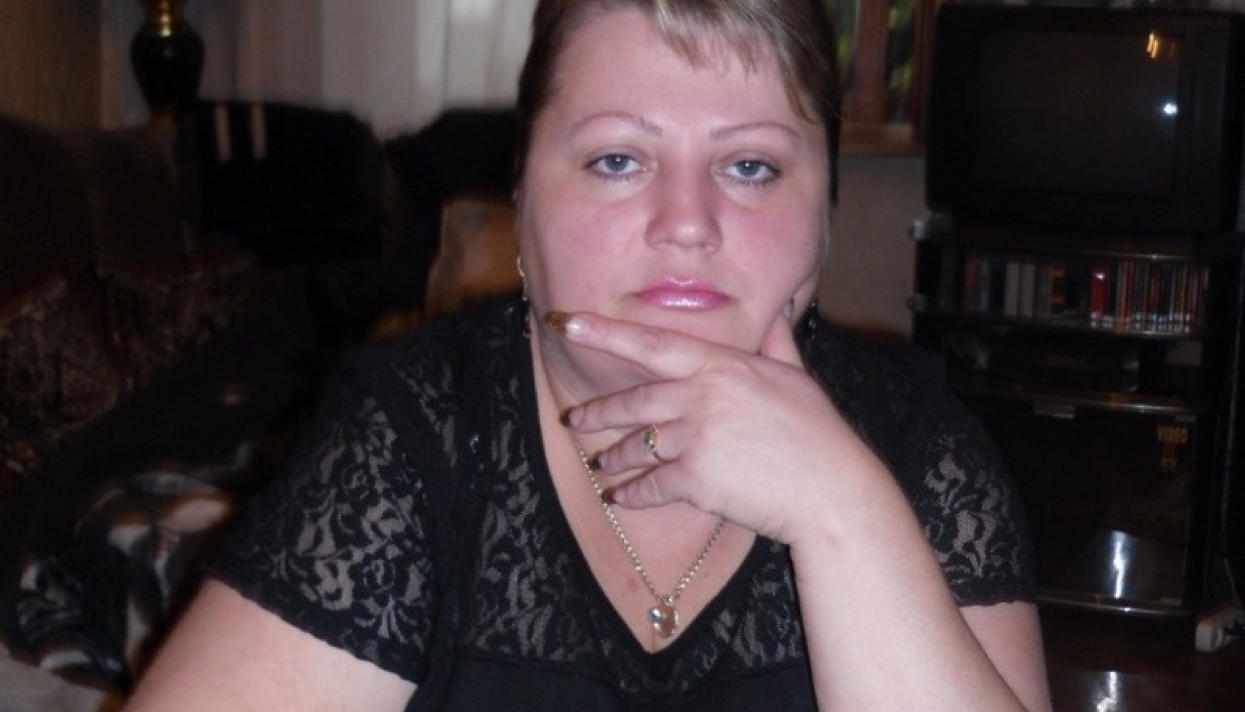
Oxana Sevastidi (Source: Meduza.io)
Journalist Olga Kortunova wrote an article posted on the opposition website Kasparov.ru, titled "When We Learn All – We Will Be Horrified." Kortunova wrote: "What surprises me most about the response to Oxana Sevastidi’s case [is that] nobody asks, how the FSB-people knew about that SMS, especially as it happened 7 years ago. Or is it so obvious to everybody that no one is disturbed and worries?
"Moreover, now it became clear that in Sochi, besides Oxana, there are more cases of SMS about the military equipment to Georgia, more people were jailed. You must at least realize that they not only are blanket eavesdropping on the entire country, they’ve amassed the factual stuff about everyone in order to effectively start criminal trials on the Stalinist level. Since 2008 the cases have laid in their possession, and in 2015 they’ve decided that finally their time has arrived to act!
"Ordinary people are imprisoned in that case. Sevastidi is a member of [the ruling party] 'United Russia' ... that is like the 1937 [Stalinist] trials. And nobody has quashed the conviction. How many similar cases throughout the country are we unaware of?
"Silence... as if no one noticed anything. Is everything normal?
"Update: read Sevastidi’s interview about how in the penal colony she was forced to work 14 hours daily, no holidays and days-off, and paid 100 roubles [$2] a MONTH. I.e. slavery like in GULAG – absolutely no difference. Looks like we simply know nothing at all. When we’ll learn – we’ll be horrified. But already now the obvious is creeping out."
(Kasparov.ru, March 16, 2017)





